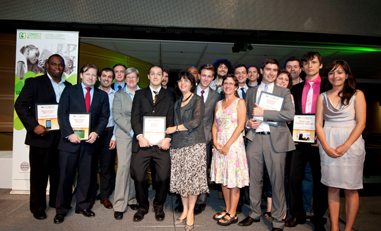
Apps for Climate winners at the Newseum during the Connecting for Climate event. Photos: Leigh Vogel/Connect4Climate
Last week, I was at the Newseum – a place in the heart of Washington DC where cutting edge communication is celebrated and experienced. We were talking about climate change but we used the language of music and creativity.
More than 400 policy makers, NGOs, journalists and software developers had come together to celebrate the winning entries of the first "Apps for Climate" competition and the launch of a new Voices4Climate competition - Connect4Climate’s new global competition for photos, videos, and music in partnership with MTV.
It was a vibrant event full of music, videos and the enchanting demonstration of “Technology, Creativity, and Action”. Andres Martinez, a young software developer from Argentina was the lucky winner of the night and the creator of EcoFacts, a web tool that shows in an innovative way energy consumption in terms of emissions of CO2 and how small individual actions can help lower your carbon footprint. It answers questions like: what happens if people turn off a light bulb, travel more by train or bicycles, or use alternative energy systems?
It was not only Andres who inspired creativity on climate change issues, the 13 remaining finalists displayed a large range of useful tools targeted to educate children, compare fuel emissions between cars, build national target emission plans, visualize climate projection impacts on different sectors, and so on. The “Apps for Climate” competition was envisioned by the World Bank Group as a way to encourage innovative use of open climate data from the WB Climate Change Knowledge Portal.
The goal was to facilitate translation of climate relevant Data into Information, into Knowledge, in order to facilitate Actions. Access to "useful and tangible" information relevant to policy and management is what this is all about.
Kenya's hip-hop star, Juliani, performs at the Newseum.
Coping with increasing climate variability and changes means that we also need to change how to access and make use of information. Better information will enhance capacity building, governance, and create a coalition for action to deal with climate change.
The enthusiastic response to the competition convinced us that we can make strides in demystifying complex climate data to make it more useful for policy makers as well as people who want to do their bit to deal with the global challenge.
As Juliani, the amazing Kenyan hip-hop rapper that indulged us with his great music finale, said "Kama si sisi…'who is going to make things happen, if it is not us?'..."



Join the Conversation